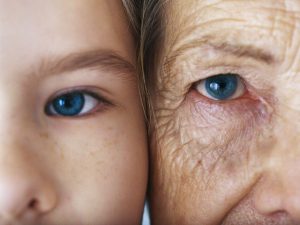An ancient monastic story tells of the holy one who asked his disciples a question about life. “Tell me which is greater,” he said to them, “wisdom or action?” And the disciples answered, “Why, it’s action, of course. What good is wisdom without action?” But the holy one answered, “Ah, yes… but what good is action that comes from an unenlightened heart?”
Stories like this challenge modern thought to the center of the soul. We can forget that every stage of life has both purpose and gift. For the young, the purpose is growth and the gift is possibility—the young give us hope. For the middle aged, the purpose of life lies in generativity and the gift is responsibility—the middle-aged give us direction. But to the older generation, we look beyond the stages of public action for experience and the gift of reflection. As the philosopher Arthur Schopenhauer said, “The first forty years give us the text; the next thirty supply the commentary on it.” Or, so we tell ourselves… But, somewhere along the way, something seems to have shifted. In the world as we experience it now, the elders disappear quickly from the public stage, the middle-aged bear the burden of the system, and the young are the focus of attention. …
The fact is that there is nothing a youth-centered culture needs more than it needs its elders. If ever we are meant to have a real role in life, it is surely now. It is precisely at this stage in life that we discover that our real purpose in life is to understand it, and then to pass that wisdom on. … Youth without insights risks action without wisdom.
Elders have things to give that no other segment of society can possibly match and, in the giving of them, come to see the past newly and the future with new faith. They come to know that the future, whatever it is, is not to be feared. What elders have to give a world worshipping at the shrine of newness and energy is memory, experience, objectivity, wisdom, and vision. They know now what really matters, what life is really about—beyond body-building, money-making, and social standing. …
It is the perspective that comes with age that sees failures as the beginning of growth… and it is spiritual persons who come to appreciate the depths of life more than the cosmetics. When we learn to value experience rather than to avoid it, when we value life more than we do the approval of the social police we harbor in our heads, then we are ready to go on growing. More than that, we are ready to be the role models of the generations coming after us. By living fully and well, we can be an antidote to a society that thinks that being high is the only way to be happy.
—by Sister Joan Chittister, OSB
Continue Reading

